Yves GARY Hits: 5661
Category: 1937 : CHALLENGE N°16
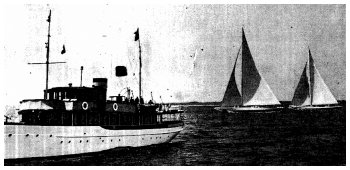 U. S. Yachts to Race in Three Series of Tests
U. S. Yachts to Race in Three Series of TestsMarch 26, 1937.— There will be three trial series for the defense candidates as in 1930 and 1934. They again will be the preliminary series, the observation one and the final trials. The first two will consist of approximately seven races each, and the last will be carried out until the cup committee selects the defender.
All the trials will be off Newport, the first two series starting and finishing at Brenton Lightship and the finals over the international course out at the buoy to be placed nine miles southeast of the lightship. The preliminary series will start on May 29, the observation one on June 12 and the final one on July 3. The early dates are because of the advancement of the international match from September to July 31.
Lambert's Yacht to Have a Novel Rig, Changed Hull in America's Cup Trials - BRONZE KEEL LENGTHENED - Work Done Secretly in Fall
|
America's Cup Candidate Is Likely to Use Duralumin Mast From Weetamoe
|
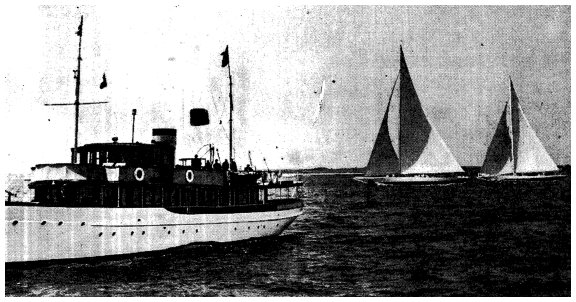 First in Series of America's Cup Defense Trials Taken by Ranger - New Ranger Beats Lambert’s Yankee 5 Minutes 56 Seconds in 30-Mile Race - Scores by Almost Mile on a Reach and Close Haul - Sets Record for Course
First in Series of America's Cup Defense Trials Taken by Ranger - New Ranger Beats Lambert’s Yankee 5 Minutes 56 Seconds in 30-Mile Race - Scores by Almost Mile on a Reach and Close Haul - Sets Record for Course
June 02, 1937.— Gliding along in an easterly breeze, Harold S. Vanderbilt's new Ranger today won the initial race in the first of a series to decide upon the defender of the America's Cup at the end of next month. She defeated Gerard B. Lambert’s rejuvenated Yankee in 5 minutes and 56 seconds over thirty miles.
In the first place, the cup committee directed a course from Brenton lightship over to the Northeast whistling buoy off clay Head. Block Island and back, in the hope of a run of fifteen miles and a beat back. As soon as the signal was set a light breeze of six miles an hour slipped and skidded from northeast by north to east. That meant apple pie going for Ranger, a reach out and a close haul back.
| 1st Race - June 2, 1937 |
||
| 1 | Ranger | 3:42:58 |
| 2 | Yankee | 3:48:54 |
| Ranger wins by 5' 56" | ||
Ranger, with her mast well amidships and double headrig of jib and forestaysail, has been dressed for reaching as thoroughly as a duck is for cooking. Yankee, on the other hand, with her stick further forward, a large mainsail and single headsail, is all dolled up for a showing against the wind. The result was that Ranger, with more than half again as much pulling head canvas, beat Yankee 13 seconds a mile to the outer mark. Close hauled back, Yankee did some fine pointing, but she never had a real chance to show her wind-eating stuff.
With all, there was another line on the race. The cup contest record for a windward and leeward course is 3 hours 24 minutes and 39 seconds, established by the defender Vigilant in 1893. Ranger took 3 hours 2 minutes and 58 seconds to cover the course today. Her remarkable world-beating feat on figures was dimmed because she had no real windward zig-zag, and no run at all, and virtually only a slant out and back.
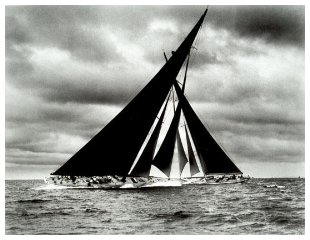 NEWPORT, R. I., June 3.— The wind, southeast at the start and south at the end, was light. The yachts were sent over a triangle of 27.7 miles, starting from Brenton Lightship. It was a beat, a close reach and a run. There was fog off to the southward, and it was overcast, cold and damp.
NEWPORT, R. I., June 3.— The wind, southeast at the start and south at the end, was light. The yachts were sent over a triangle of 27.7 miles, starting from Brenton Lightship. It was a beat, a close reach and a run. There was fog off to the southward, and it was overcast, cold and damp.
For the windward work of eight and a half miles, Rainbow had one of the new “quad” jibs with staysail, and Yankee had a small Genoa. Yankee led for the line, with Rainbow about a length and a half astern, but to weather. Rainbow pointed splendidly and soon worked into a commanding position on the starboard tack.
Rainbow turned the first buoy 2 minutes 10 seconds ahead. She set a ballooner and kept on her staysail for the reach to the second mark. That was the dress Ranger used reaching. Yankee went on a way with her small Genoa after rounding. Finally she changed to a larger one. Suddenly Rainbow’s ballooner tore. There was a time getting it in. She held up and finally broke out a smaller ballooner. With it she did not have enough canvas and Yankee began closing the gap between them.
Rainbow, however, led to the second mark by 1 minute and 12 seconds, having lost 58 seconds of her lead.
| 2nd Race - June 3, 1937 |
||
| 1 | Yankee | 3:31:03 |
| 2 | Rainbow | 3:36:30 |
| Yankee wins by 5' 27" | ||
Rainbow prepared to set her spinnaker. The wind had hauled directly astern. It was a question of which hand to go on. Rainbow went on with her spinnaker boom out and her kite up in stops. Yankee bore off to the eastward after rounding, jibed her main boom over to port and set a huge parachute. Rainbow then broke out a smaller one, with her main boom to starboard. Once ?lled, Yankee's kite pulled her up alongside Rainbow.
Then Yankee’s spinnaker dipped in the sea several times and she slowed down as if she had run into a pool of glue. Rainbow slid on into another lead. Yankee tried another circuit to the eastward and they were far apart. Nearing the lightship Rainbow had to jibe. In came her parachute and on the other hand she set a ballooner, Suddenly Yankee began to come on, A spinnaker pole was hurriedly put on Rainbow. Several minutes later her kite was out again but it was too late. Yankee, filled away, was tearing for the finish.
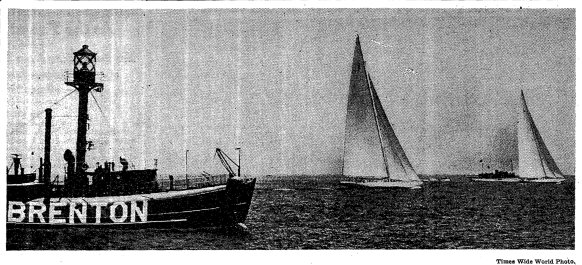 NEWPORT, R. I., June 4.—Winning her second straight race in the preliminary series to select the defender of the America’s Cup, Harold S. Vanderbilt's new Ranger made a most impressive showing today. She defeated her owner-skipper’s older boat, now Chandler Hovey’s Rainbow, by 1 minute and 58 seconds over thirty miles.
NEWPORT, R. I., June 4.—Winning her second straight race in the preliminary series to select the defender of the America’s Cup, Harold S. Vanderbilt's new Ranger made a most impressive showing today. She defeated her owner-skipper’s older boat, now Chandler Hovey’s Rainbow, by 1 minute and 58 seconds over thirty miles.
It was a contest from Brenton lightship off here over to the whistling buoy off Clay Head, the big sand mound of Block Island, and back, and it was in a southwest breeze that piped up from eight to fifteen knots.
Rainbow was away first, fifteen seconds ahead of Ranger, but the latter had her nose in a windward lane. Ranger went about right after the start. Rainbow following, and they stood toward the Narragansett shore.
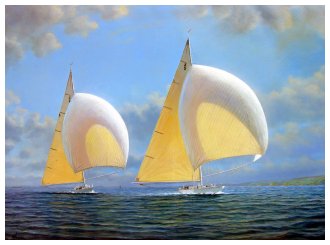 For a time Rainbow outpointed Ranger, and the new boat turned again, but the old one was after her. As they went in toward the beach that time they found the breeze lighter there and slowed up some. It also headed them off and there was a repetition of the tacking. On a final hitch inshore toward the tip of Point Judith the fresher breeze came on, showing on the water. Vanderbilt quickly bore Ranger off to meet it and as she did she fairly shot out into the lead. The race was won in that one manoeuvre.
For a time Rainbow outpointed Ranger, and the new boat turned again, but the old one was after her. As they went in toward the beach that time they found the breeze lighter there and slowed up some. It also headed them off and there was a repetition of the tacking. On a final hitch inshore toward the tip of Point Judith the fresher breeze came on, showing on the water. Vanderbilt quickly bore Ranger off to meet it and as she did she fairly shot out into the lead. The race was won in that one manoeuvre.
The wind increase swelled the sea roll and washed up a splash on top of it. The wind hauled and they started sheets a bit. Both began going rails down. Two-thirds of the way between Judith and the turning buoy, Ranger’s quad flapped out. It was sheeted in with difficulty.
| 3rd Race - June 4, 1937 |
||
| 1 | Ranger | 3:48:19 |
| 2 | Rainbow | 3:50:17 |
| Ranger wins by 1' 58" | ||
Rainbow closed up some, but Ranger had a commanding lead in the good breeze. Their lee rails went under water as they logged 11 1/2 knots. Ranger rounded the buoy 2 minutes 12 seconds ahead.
Olin Stephens relieved Vanderbilt at Ranger's wheel for the reach back. Under the big ballooner was a staysail and when it was seen that Rainbow would not change headsails it was thought Ranger would run away. Instead, Rainbow gained 14 seconds.
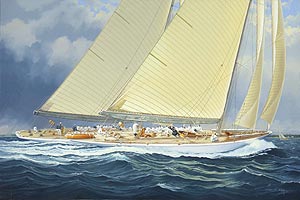 Defeats Lambert's Yankee by 2 Minutes 5 Seconds Over 28-Mile Windward and Leeward Course Off Newport
Defeats Lambert's Yankee by 2 Minutes 5 Seconds Over 28-Mile Windward and Leeward Course Off Newport
| 4th Race - June 5, 1937 |
||
| 1 | Ranger | 4:48:05 |
| 2 | Yankee | 4:50:10 |
| Ranger wins by 2' 05" | ||
NEWPORT, R.I., June 5.— Ranger does not require much stirring air to make her go. She led Yankee by five minutes and thirteen seconds over the fifteen miles to windward, and that has been supposed to be Yankee’s forte with her enlarged small-boat rig with single headsail. Running back, Yankee picked up three minutes and eight second, but Ranger tossed most of that away.
Ranger held high of the course all the way, and a mile from the finish she took in her parachute and jibed. A ballooner was set and she started to reach for the finish but she had turned too soon. Yankee was coming fast. A plain spinnaker was set on Ranger on the other hand to speed her up.
| 5th Race - June 8, 1937 |
||
| 1 | Yankee | 4:34:50 |
| 2 | Rainbow | 4:36:53 |
| Yankee wins by 2' 03" | ||
NEWPORT, R. I., June 8. Racing through rain out over a battered-down sea, Gerard B. Lambert’s America’s Cup yacht Yankee this afternoon took the measure of Chandler Hovey’s Rainbow by two minutes and three seconds over 23.7 miles, and thus won her second race in the preliminary defense series, both over the last cup defender. Yankee not only won, but she definitely went better than she had.
NEWPORT, R.I., June 9.— In the final race of the preliminary series to select the defender of the America’s Cup, Harold S. Vanderbilt’s new Ranger made faster time today over thirty miles of windward and leeward sailing than ever was set in an international match for the coveted prize. With this performance Ranger remained unbeaten after four races.
The record for a cup race is 3 hours 24 minutes 39 seconds, the time of the defender Vigilant in 1893 against Valkyrie. After forty-four years the new Ranger, with her makeshift rig after her dismasting, and only partially tuned up, covered the distance in 3 hours 15 minutes 23 seconds. That was 9 minutes and 16 seconds better than the cup record, a truly remarkable performance. |
PRELIMINARY TESTS SWEPT BY RANGER
Ranger remained unbeaten after four races. |
||||||||||||||||||||||||||||||||

| 1st Race - June 19, 1937 |
||
| 1 | Ranger | 3:22:53 |
| 2 | Yankee | 3:29:56 |
| Ranger wins by 7' 03" | ||
NEWPORT, R. I., June 19.-—Harold S. Vanderbilt’s new Ranger defeated Gerard B. Lambert’s Yankee by 7 -minutes 3 seconds around a triangle of 27.7 miles, making a procession of the affair rather than a contest. And it was no breeze ?uke.
Yankee led by a scant boat length on a stiff reach to sea for ten miles. Then Ranger shot ahead, completely outsailed Yankee to windward and wound up by smothering her on a final broad reach.
| 2nd Race - June 20, 1937 |
||
| 1 | Ranger | 3:57:32 |
| 2 | Rainbow | 4:08:37 |
| Ranger wins by 11' 05" | ||
NEWPORT, R. I., June 20.- Fanned along by a light southeasterly breeze over an almost smooth sea, Harold S. Vanderbilt’s Ranger continued her unbroken string of victories today in the observation trials to choose the America’s Cup defender.
She had Chandler Hovey’s Rainbow as a rival, and in her sixth race administered the worst defeat she has inflicted so far. Rainbow, the last cup defender, in easy going just to her liking as the lighter craft, trailed home over 26.3 miles of windward work and reaching by 11 minutes and 5 seconds.
Against the wind and slanting off it, Ranger was mistress of the sea this afternoon.
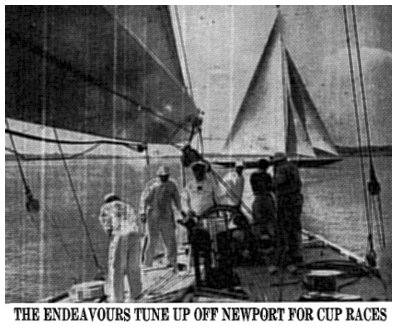 RACE 3 : YANKEE TAKE THIRD TRIAL RACE - RAINBOW DID NOT FINISH
RACE 3 : YANKEE TAKE THIRD TRIAL RACE - RAINBOW DID NOT FINISH| 3rd Race - June 22, 1937 |
||
| 1 | Yankee | 5:21:55 |
| 2 | Rainbow | D.N.F. |
| Yankee wins | ||
NEWPORT, R. I., June 22.-—Making her way over 23.7 miles through two windless drifts and four rain squalls, Gerard B. Lambert’s Yankee today won the third of the observation trial races toward selection of the America's Cup defender.
Chandler Hovey’s Rainbow, her opponent, did not finish. She was a third of a mile astern when she gave up a hopeless task.
| 4th Race - June 23, 1937 |
||
| 1 | Ranger | 4:43:22 |
| 2 | Yankee | 4:48:52 |
| Ranger wins by 5' 30" | ||
NEWPORT, R. 1., June 23.-- In a fluttering breeze over the sea off here today, Harold S. Vanderbilt's undefeated new Ranger won her seventh victory in the America's Cup defense trials and her third in the present observation series. She defeated Gerard B. Lambert's Yankee, her closest competitor so far, by 5 minutes 30 seconds over 27.7 miles.
After falling astern because of sail trouble, Ranger set her new 18,000-square-foot parachute spinnaker of record size and drew out, never to be headed again. Yankee set hers of 16,000 square feet and it tore in half.
| 5th Race - June 25, 1937 |
||
| 1 | Yankee | 5:21:21 |
| 2 | Rainbow | 5:33:57 |
| Ranger wins by 12' 36" | ||
NEWPORT, R. I., June 25.- Gerard B. Lambert’s Yankee scored over Chandler Hovey’s Rainbow today by 12 minutes and 36 seconds in a race of 26.3 miles which was the greatest margin recorded by one yacht over another in the America’s Cup defense trials.
To Yankee’s credit it went as the outstanding time victory or, the other way around, Rainbow. defender of three years ago, suffered the worst defeat.
As a result it seems conclusive that Yankee. downed by Rainbow in the trials of 1934, is a greatly improved racer despite her disappointing windward work with her smaller head rig, which was supposed to make her a wonder against a breeze.
RACE 6 : CUP YACHTS FAIL TO COMPLETE LAST RACE - LAMBERT’S CRAFT AHEADYankee and Ranger Drop Out 3 1/2 Miles From Finish With Half-Hour Left.NEWPORT, R. I., June 26.-— Three and one-half miles from the finish of a hard struggle today, Yankee and Ranger dropped out of the last observation series race in the America's Cup eliminations. |
In the observation series Ranger stood out, with Yankee doing the second best, but an analysis of their contests shows that each beat the other running and each the other reaching. Ranger, however, won twice to windward. Ranger revealed surprising windiward quality. At times she headed up three points from a good breeze, the highest that any sailing yacht has attained. |
|||||||||||||||||||

NEWPORT, R. I., July 3.-—-Covering a thirty-mile triangle, with close haul work, in the fastest time on record, Harold S. Vanderbilt’s powerful yacht Ranger administered an overwhelming defeat today to Gerard B. Lambert’s Yankee.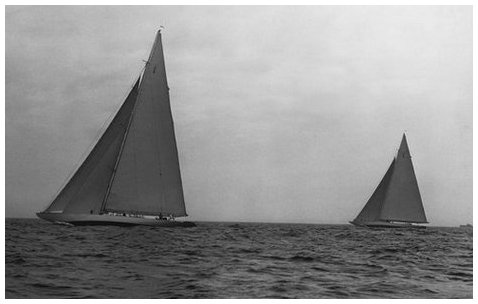 It was the first contest of the final trials to select a defender of the America’s Cup to meet T. O. M. Sopwith’s Endeavour II. Ranger won by 14 minutes and 26 seconds, and when she finished Yankee was hull down on a misty horizon astern.
It was the first contest of the final trials to select a defender of the America’s Cup to meet T. O. M. Sopwith’s Endeavour II. Ranger won by 14 minutes and 26 seconds, and when she finished Yankee was hull down on a misty horizon astern.
Mr. Sopwith watched the race from his motor yacht Philante. Ranger’s elapsed time was 2 hours 43 minutes 43 seconds, just a shade under twelve knots average for the course. The international match record is 3 hours 9 minutes 1 second, made by the challenger Endeavour three years ago. Yankee, in the famous stiff wind defense trial , contest of 1930, sailed around a triangle in 2 hours 47 minutes 59 seconds. The sloop Columbia, in 1901 off here, finished over what was to have been a windward and leeward course in less than three hours. Her time was 2 hours 52 minutes 4 seconds, but the breeze changed direction and shifted the beat into a reach. Her mark always has been placed in the doubtful class.
Ranger also was speeded up this afternoon by a. south by east breeze of twelve miles an hour backing to southeast by south at fourteen miles, and blowing away her necessity for tacking. She was close hauled on the first leg, but that hardly would place her mark on the books as a true one with weather work. However, her performance was a remarkable one.

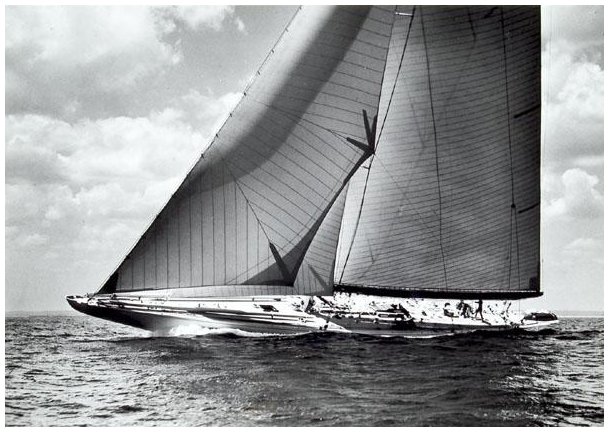 Ranger, Harold S. Vanderbilt's new sloop, tonight was selected to defend the America's Cup against T. 0. M. Sopwith's Endeawour II. They will meet off here on July 31 in the first race of the international match, the sixteenth one for the old silver mug brought here from England eighty-six years ago by the historic schooner yacht America.
Ranger, Harold S. Vanderbilt's new sloop, tonight was selected to defend the America's Cup against T. 0. M. Sopwith's Endeawour II. They will meet off here on July 31 in the first race of the international match, the sixteenth one for the old silver mug brought here from England eighty-six years ago by the historic schooner yacht America.
NEWPORT, R. I., July 6.--The choice of the Ranger came suddenly, although she had been outstanding in the defense trials against Gerard B. Lambert’s Yankee and Chandler Hovey’s Rainbow, defender three years ago. Ranger had won eight races and had not been defeated. Every other defender had struggled for victory through at least one defeat.
There was no race today. Ranger and Yankee went out, but there was a dense fog and no breeze. The attempt to have a contest was given up. Only one race in the final trials had been concluded. That was the one last Saturday, when Ranger distanced Yankee.
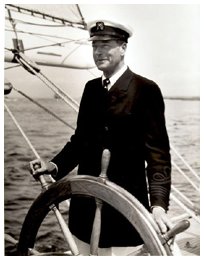 Endeavour II was raced in English waters last Summer, but she was dismasted twice and her superiority over the first Endeavour was questioned somewhat. However, Mr. Sopwith named her as the challenger last Thursday, having had until then to substitute the older racer if he wished.
Endeavour II was raced in English waters last Summer, but she was dismasted twice and her superiority over the first Endeavour was questioned somewhat. However, Mr. Sopwith named her as the challenger last Thursday, having had until then to substitute the older racer if he wished.
Mr. Lambert and Mr. Hovey, in high sportsmanship, immediately offered their yachts, their efforts and all they could give to help get Ranger ready for her national representation.
With skipper Vanderbilt there will be in Ranger’s afterguard Olin J. Stephens, one of her co-designers, Roderick Stephens Jr., Arthur Knapp and Professor Zenas R. Bliss of Brown University, navigator.
This was Mr. Vanderbilt’s fifty-third birthday. He received word of the selection of his yacht simply, making no comment. He will be the second skipper to sail a defender three times. The only other to do so was the late Captain Charles Barr, who was at the wheels of Columbia in 1899 and 1901 and of Reliance in 1903.
